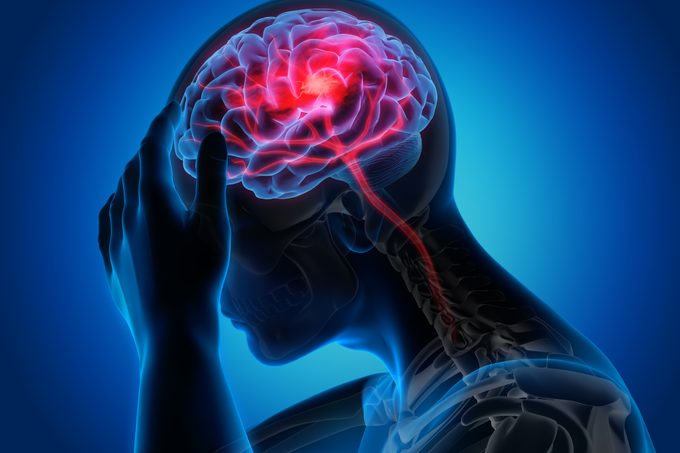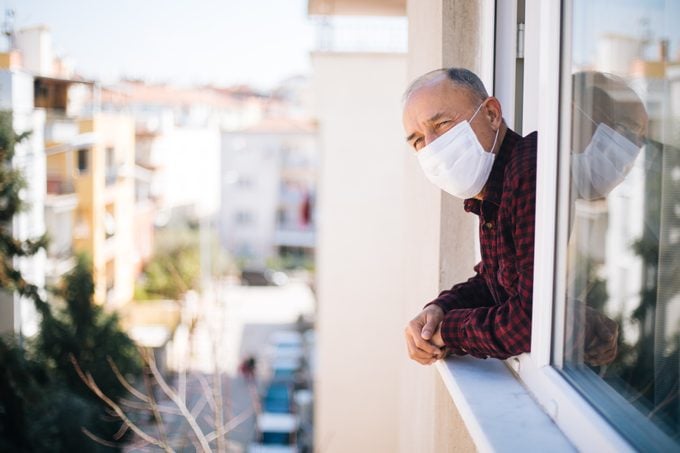Can the Coronavirus Cause Strokes? What Doctors Need You to Know
Updated: Sep. 10, 2020
There's a link between Covid-19 and stroke risk—even among younger patients. Here's what to do if you suspect a coronavirus-related stroke.
Everyone’s on high alert for symptoms of Covid-19—fever, exhaustion, and shortness of breath are some of the common ones when the virus attacks the lungs. But SARS-CoV-2, as the virus is officially known, also causes trouble in the blood, and it can do so even in people who don’t show symptoms. Doctors have found the novel coronavirus can trigger a stroke in some patients, including those under the age of 50.
“[Doctors] know something is happening in regards to coronavirus and its link to the increased risk of stroke, but because the virus is so new, it’s hard to put our finger exactly on the reason why,” says Jeremy Payne, MD, PhD, director of the Stroke Center at Banner at the University Medicine Neurosciences Clinic in Phoenix. Here’s what doctors and researchers know so far—plus the warning signs of a blood clot or stroke, and what to do if you suspect a stroke.

Blood clots and strokes
About 80 percent of strokes originate with blood clots that block blood supply or oxygen to several organs. (Another type—hemorrhagic stroke—results from a ruptured artery that bleeds into the brain.) When clots form, they can block blood vessels that supply oxygen to the brain, causing what’s known as an ischemic stroke. They may also block blood supply to the lungs and damage tissue—an event known as pulmonary embolism.
Blood clots can form for a number of reasons: “There’s a giant list to consider,” says Dr. Payne. “Things like wear and tear on the heart and blood vessels that come with age, high blood pressure, diabetes, high cholesterol, smoking, obesity, or sleep apnea to name a few.” Because many of the risk factors for stroke develop over a lifetime, this explains why most cases—nearly three-quarters of strokes—occur in people age 65 and older; the risk doubles each decade after 55.
Covid-19 and stroke risk
Given that strokes are typically a condition that plagues the elderly, doctors were immediately alarmed when they began seeing strokes in younger people who tested positive for Covid-19. Research published in April 2020 in the New England Journal of Medicine reported five cases of large vessel stroke (the most common type) in New York City in patients younger than 50 years old.
“The virus seems to infect the lining of the blood vessels,” says Jason Tarpley, MD, PhD, interventional neurologist and director of the Pacific Stroke and Neurovascular Center at Providence Saint John’s Health Center in Santa Monica. “The endothelium, a smooth, inner tissue lining in blood vessels that can prevent clots from forming, gets infected by coronavirus, which then causes a constellation of events that leads to clot formation.” Dr. Tarpley adds that Covid-19 also drives up levels of a protein related to blood clots called D-dimer. “A high D-dimer correlates with a higher rate of mortality,” Dr. Tarpley says.
Covid-19 inflammation as a precursor for stroke
“Systemic inflammatory diseases seem to increase risk of stroke, as the inflammation tends to trigger blood clotting and activates plaque in the blood vessels and arteries, making it stickier and more unstable,” says Dr. Payne. He adds that the stroke rate goes up during flu season for these reasons and that a similar mechanism may be happening among Covid-19 patients. “It could be a general inflammatory reaction, as people are ill with the virus and the immune system is acting in response, or it could be due to an individual’s risk factors combined with the virus’s ability to cause clotting,” Dr. Payne says. (Here’s what the CDC wants you to know about coronavirus super spreaders.)
Preventing strokes in Covid-19 patients
Dr. Payne says there’s an overall awareness in hospitals and among doctors that Covid-19 patients are at risk for blood clots (whether it be the lungs, heart, or anywhere else in the body) and it’s impacting the treatment plan for Covid-19 cases.
“Many hospitals may put patients on blood-thinning medications from the start, which is what we would traditionally do if someone had a large blood clot,” says Dr. Payne. Blood-thinning medications prevent clots from forming as well as prevent existing clots from getting larger.

Stroke risk from Covid-19 is rare
While the idea that the virus could raise your risk for stroke is frightening, the thing to remember is that the stroke risk from the virus seems very small. “Neither myself nor my partners in California have seen a large vessel stroke in a coronavirus patient; my colleagues in New York have, albeit infrequently,” says Dr. Tarpley. “It could be that there are two strains of the virus and one of them produces stroke while the other does not, or it could be that the prevalence of coronavirus is so high in New York that’s why doctors are seeing more of this there.” (Beware of the 19 coronavirus myths you should stop believing.)
How to spot the warning signs of stroke
Infected or not, everyone should know the symptoms of a stroke. Dr. Tarpley says to remember the acronym FAST: facial droop, arm weakness, speech difficulties—any of which means it’s time to call 911. Dr. Payne adds this acronym may be amended over time to BE FAST, which includes balance (dizziness or lack of coordination) and eyes, such as trouble seeing out of one or both eyes. While these acronyms don’t account for the entire spectrum—here are some more stroke symptoms to watch for—it covers the broad neurological red flags that often signal a clot. (And ladies, make sure you’re not ignoring these stroke symptoms that often get ignored by women.)
Most importantly, both Dr. Tarpley and Dr. Payne emphasize if you think you or someone you know are having a stroke or any medical emergency during this pandemic, you need to go to an emergency room. “We’re seeing a significant decrease in the number of patients who are coming to the hospital to be evaluated for stroke,” says Dr. Tarpley. “And it’s not because fewer people are having strokes. While social distancing has been very successful it has encouraged stroke and heart attack patients to stay home and create a dangerous situation for themselves.”
“If you’re experiencing a stroke, there is a lot doctors can do for you,” adds Dr. Payne. “But time is important and the faster you get medical care the better off you’ll be. Think of it like coming home to your house on fire. The longer you stand around debating what to do about it, the more it burns down.”
Next, read the other troubling new Covid-19 symptoms and complications.













